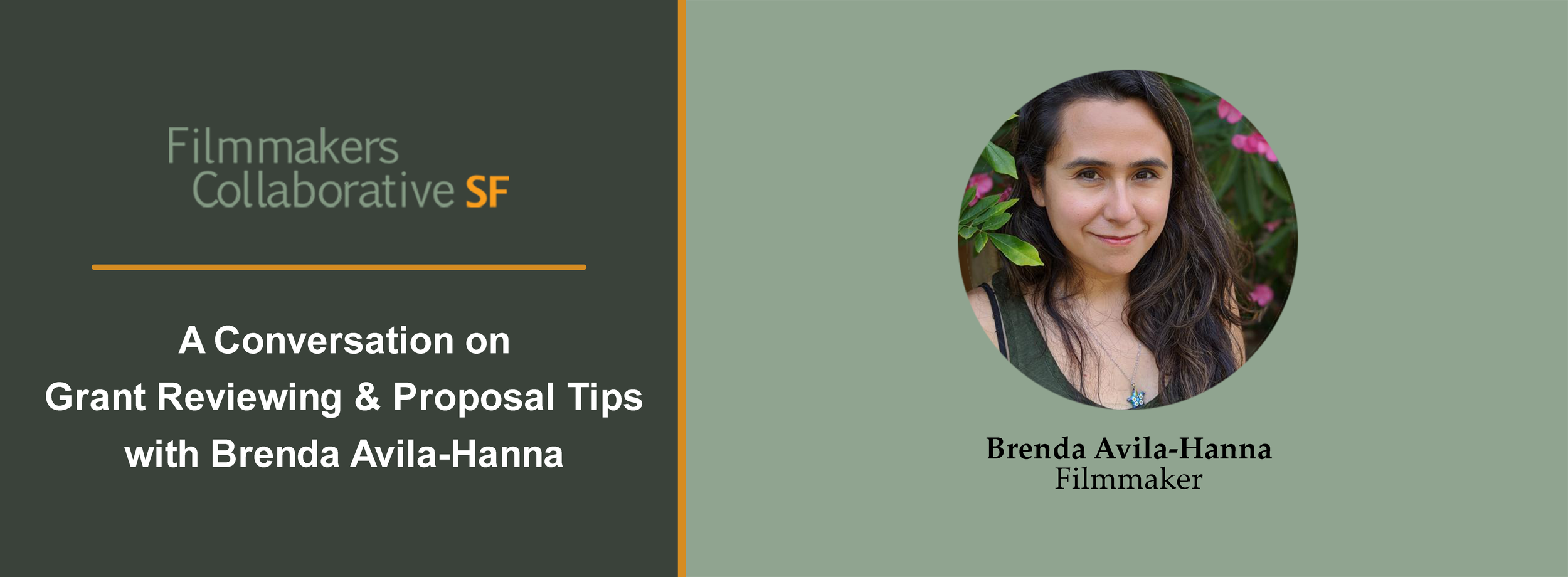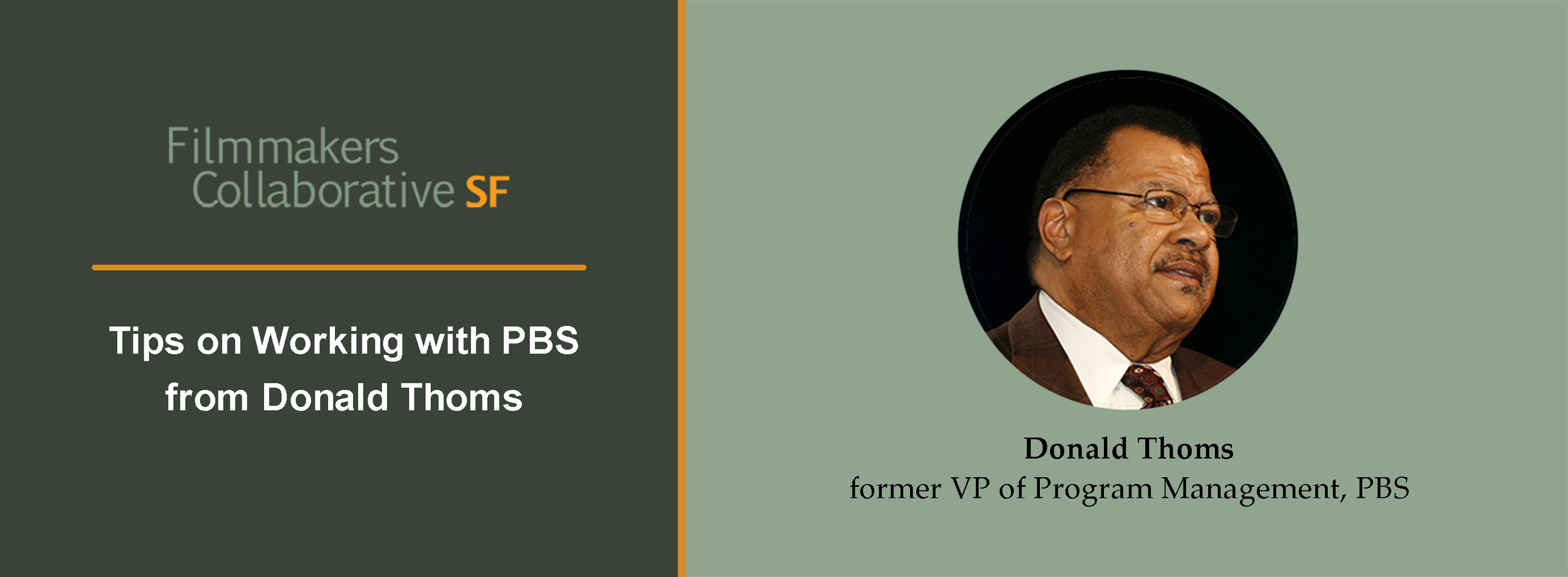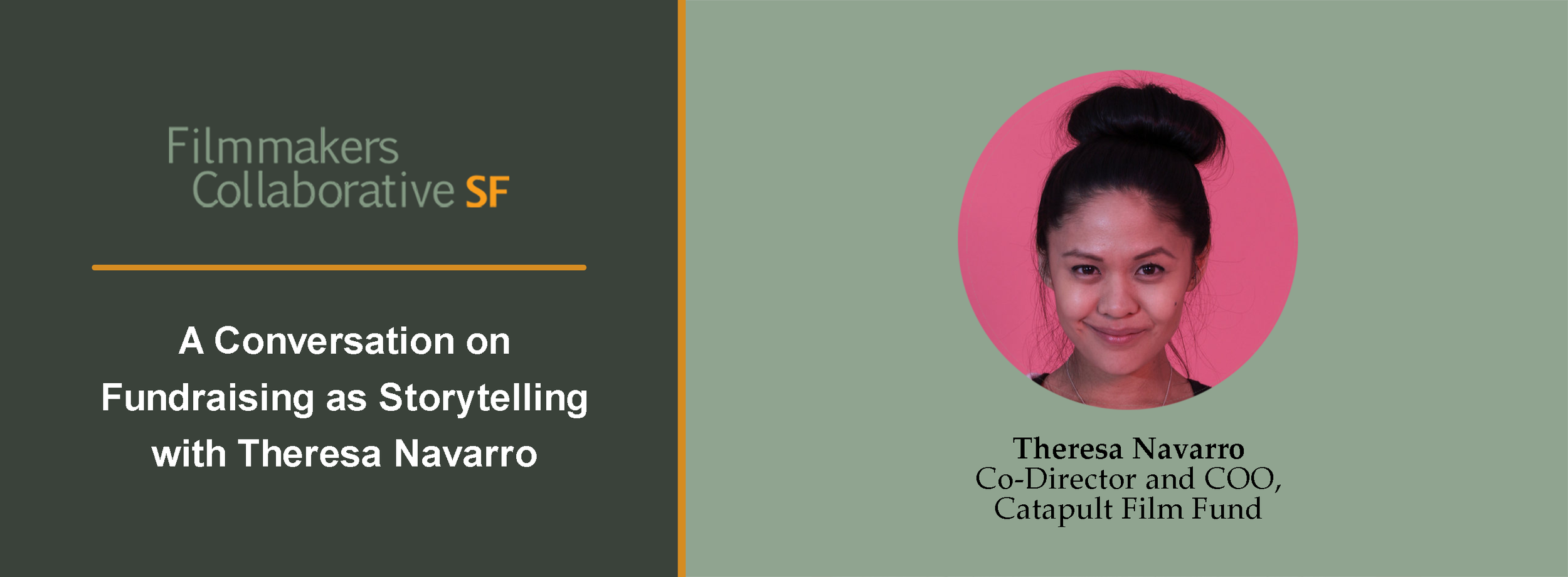A Conversation on Grant Reviewing and Proposal Tips
with Brenda Avila-Hanna
“I started reviewing proposals at a very exciting time because
it's fairly recent that filmmakers get questions
about authorship, about connection to the community, about challenges.
There are very important questions that are being asked now
that weren’t being asked before.”
- Brenda Avila-Hanna, filmmaker
We spoke with Brenda Avila-Hanna about her insights on the current state of documentary grant applications and her own journey that began with struggling to write proposals as a non-native English speaker. Brenda is a filmmaker and educator, who has been a proposal reviewer for BAVC MediaMaker Fellowship, IDA Pare Lorentz Fund, Video Consortium Mexico, and Watsonville Film Festival. She shared lots of great advice for proposal writing and developing projects.
Brenda will be a presenter in our upcoming For Us, By Us Filmmaker Incubator. Apply now, applications close Feb 22!
Can you tell us about your work and experience in the documentary industry?
I was born and raised in Mexico City and I moved to the States as a younger adult. I wanted to be a journalist, but because I wasn't fluent in English and I didn't grow up here, there was a challenge. I turned to film because I could show rather than tell and it felt like a more universal language.
I've been making documentaries on and off for the past 12 years or so. I've been doing a lot of producing on documentaries and nonprofit work, I’ve been part of some fellowships that have been very helpful and have had different opportunities in public media that are always really generous with showing how the pipeline works. I've also been working with New Day films, which is an educational distribution co-op that's owned and operated by filmmakers, and that became a great opportunity for me to see a whole new world of trying to make educational distribution accessible and looking at it from a perspective of who's in the margins.Through that, I started getting into more industry initiatives and connecting with more peers.
How did you get involved with grant reviewing?
Through the programs and initiatives I was in like DOC NYC Documentary New Leaders and the Rockwood JustFilms Fellowship, I met people from a lot of different areas of the industry. Some of those people worked in grants, leading funding efforts, and they gave me my first opportunities reviewing grants. I’ve reviewed for the BAVC MediaMaker Fellowship, IDA Pare Lorentz Fund, Video Consortium Mexico, and a fellowship for the Watsonville Film Festival.
What interests you about grant reviewing?
I think it’s important as a filmmaker to have that experience of being on the other side of things. English is not my first language and when I first started writing grants, it was hard just to put together a whole paragraph and my concern was thinking about the right prepositions. It feels like all of a sudden you have to be competent at everything. When everybody is asking the same thing, it feels like everybody wants the exact same kind of person. It’s hard to see that and get rejected and not take it personally. So I wanted to first understand why this is done, the reasoning behind application questions and what discussions people are having behind the scenes. Then, hopefully I could share it in other ways and make the process more transparent for others.
What have you learned from being part of that process?
I started reviewing proposals at a very exciting time because it's fairly recent that filmmakers get questions about authorship, about connection to the community, about challenges. There are very important questions that are being asked now that weren’t being asked before. I think that makes for better processes that are more respectful to the people that are putting their lives on the screen and also intentional about who is going to be watching the stories.That excites me because you can learn a lot about a person that way.
What is your advice for people who are intimidated by the proposal writing process?
I don't want to sound very cliche, but don't be afraid of failing. The worst thing that can happen is that you get rejected and that's not really that bad.
One thing I would tell people is to go to those webinars. Maybe some people take it for granted, but that's fairly new and having an opportunity to ask questions and get to know the people who are going to be reviewing and their values is helpful. Sometimes they share stories about applications that work and that didn't work. Look at the kind of films they’re funding or supporting.
Also, don’t do it alone. Ask other people for help, whether that’s checking in on you like friends studying for a test, or looking over your proposal. I would advise that you write your heart out and share it with someone who has no idea what your story is about, so you can see if they get it and you’re on the right track.
What do you think are common misconceptions filmmakers have?
A mistake is to feel that rejections are personal. There's a lot of people who will get rejected and never apply for that grant ever again because they were rejected. I have been a finalist for the same grant five times and it’s hard not to hold a grudge, but I know it’s not personal.
One of the other mistakes is thinking you have to be the “perfect” person for your film who checks every box. Your awareness of what you don’t know or what you’re missing is important. It’s helpful for reviewers to read that you are aware of what your areas of growth are and that you are being intentional about your efforts. You can’t be good at everything.
I think a lot of filmmakers think they have to do all of this alone and save a lot of money, show that they can make wonders with $2 and they’re ready for the grind. At least for me, I’ve had enough of glorifying the hustle. I want to know that you’re going to take care of yourself and your collaborators and that you’re going to compensate people fairly.
What is your advice for underrepresented filmmakers?
I see this usually from historically underrepresented communities—people underestimate the power of their personal story. It’s like a bit of imposter syndrome. I’ve seen filmmakers where there’s a clear connection between their lives and their stories but they don’t quite make that connection in their proposal. They don’t own their experiences and they underestimate how powerful it is to explain their connection to their personal experiences. That’s to their own detriment because the reviewers reading your proposal want to know about your connection to the community and why you are the best person to tell the story.
Can you talk about the process of putting your thoughts into the proposal so the reviewers can really understand your vision?
I understand why that can be difficult because it's hard to write about yourself. It's hard to be vulnerable. A lot of the questions lately that I've seen in grants are very intentional writing prompts for that, so kudos to those who will make those specific questions. Doc Society, for example, is one. If people want to look at that, those are some helpful prompts.
Thinking about the importance of the story, one of the best ways to find those things is to tell it to a friend. Have someone that really cares about you and you feel comfortable with, read through the questions with you. They can tell you if you really answered the question and if there’s a flow to what you’re saying. Especially a good friend, they see things in you that sometimes you don’t see in yourself. I’ve had that happen with friends. I’ll ask “why didn’t you mention that your parents are immigrants?” and they’ll say “oh, well, I don’t think that’s important” but it is important to the story. Have that person that sees you and knows you to keep you in check with those things.
What other changes have you seen in the industry?
I would like to highlight Brown Girls Doc Mafia as an example of a great application. Maybe it was two or three years ago that they started letting people submit videos or do the application in their native language and they would find a native speaker to help out with that. I feel excited about the moment we're in right now because for someone who doesn’t speak English as a first language, it's just so hard to do a grant proposal. I think of myself back when I didn't speak the language fluently, when I didn't know where to go, what to do, and how the system operated. Some applications are also becoming shorter and being in incremental steps so you don’t have to put in 5 hours of your time putting together an application just to get rejected.
Another thing I loved about Brown Girls Doc Mafia is that they invited all the applicants to a Zoom celebration to announce the results. It was after the results were sent so people who were rejected already knew that, but the spirit of it was so joyful like they wanted to hold us in community, to connect with fellow applicants and support one another. Even if you didn’t get the grant, at least you gain some community. You put yourself out there and you were seen and valued, and invited to the table.
Having that sort of closure in that moment and seeing other people who didn’t get it, I saw that I was in great company, not that we were the rejected and they were the grantees. It’s looking at it from abundance rather than scarcity. It is competitive but there’s also some other types of abundance to that and I think community can be something that could come out of these processes that can be so competitive at times.




